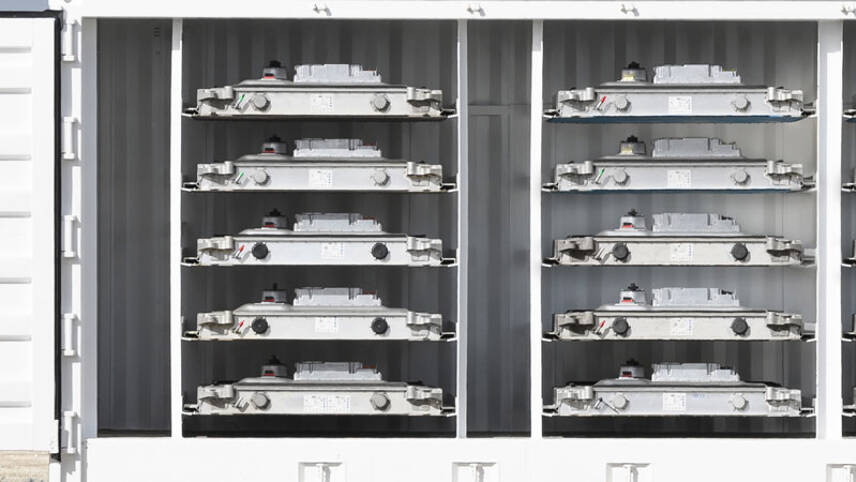Register for free and continue reading
Join our growing army of changemakers and get unlimited access to our premium content

Pictured: Wykes Engineering's battery energy storage system using second-life Jaguar I-PACE batteries
Jaguar Land Rover (JLR) has teamed up with Wykes Engineering to develop one of the UK’s largest energy storage system comprising second-life car batteries.
Used batteries from Jaguar I-PACE vehicles will be converted into large-scale container systems that will be installed at three locations across the Wykes-owned Chelveston renewable energy park on the Northamptonshire/ Bedfordshire boarder.
Each of the three locations will be capable of storing up to 2.5MWh of energy. One is already partly operational. Once all three are in place and 7.5MWh of storage is complete, the network will be able to store and discharge enough electricity to serve 750 homes for a day.
The battery systems will store electricity generated by the wind turbines and solar panels at the energy park when generation conditions are favorable, and discharge when demand is higher and generation conditions are poorer. They will also be capable of drawing power out of the grid during off-peak hours to store for future use.
JLR batteries used in this project will be able to operate at 70% to 80% of the capacity they will have had when in use in vehicles. EV batteries need to be replaced once their capacity and general health falls below a certain level, for the vehicle to function at the same level of performance.
It will take 30 I-PACE batteries to produce a 2.5MWh energy storage cabin.
Circular energy transition
Adopting batteries is widely considered to be crucial to maintain energy security as more intermittent renewable electricity generation comes online. This is also key to saving on network costs as electricity demand increases with the electrification of sectors such as heat and road transport.
By using second-life EV batteries for energy storage, other challenges can be mitigated – the demand for virgin raw materials including critical materials for batteries, as well as the need to responsibly reuse or recycle EV batteries no longer fitted in vehicles.
JLR’s executive director for strategy and sustainability, Francois Dossa, said: “Our sustainability approach addresses the entire value chain of our vehicles, including circularity of EV batteries.
“Using the 70-80% residual capacity in EV batteries, before being recycled, demonstrates full adoption of circularity principles.”
The Jaguar brand is set to stop selling petrol and diesel vehicles in 2025, transitioning to an electric catalogue. Land Rover’s strategy involves a slower transition in line with forthcoming bans on new petrol and diesel cars and vans in the UK (2030) and EU (2035).
JLR as a group is aiming to deliver a net-zero value chain by 2039 and has stated that embedding circular economy approaches will be critical to deliver this pace of decarbonisation across its value chain.
Mercedes-Benz
In related news, JLR rival Mercedes-Benz has this week put forward a purchase order for the development of a new recycling plant for lithium-ion batteries.
It will work with Neometals Ltd and SMS Group to deliver the recycling capacity in Kuppenheim, Germany. It is hoped that work on the technology will begin at the end of 2023, shortly after the building itself is completed. The facility will be able to process 10 tonnes of battery material each day once its reaches full operational capacity.
Related news: UK Government drawing up plans to clamp down on battery waste, from vapes to EVs


Please login or Register to leave a comment.